
John Curtin was an Australian politician who served as the 14th prime minister of Australia from 1941 until his death in 1945. He held office as the leader of the Australian Labor Party (ALP), having been most notable for leading the country through the majority of World War II, including all but the last few weeks of the war in the Pacific. Curtin's leadership skills and personal character were acclaimed by his political contemporaries and he is frequently ranked as one of Australia's greatest prime ministers and political leaders.

The Communist Party of Australia (CPA), known as the Australian Communist Party (ACP) from 1944 to 1951, was an Australian communist party founded in 1920. The party existed until roughly 1991, with its membership and influence having been in a steady decline since its peak in 1945. Like most communist parties in the West, the party was heavily involved in the labour movement and the trade unions. Its membership, popularity and influence grew significantly during most of the interwar period before reaching its climax in 1945, where the party achieved a membership of slightly above 22,000 members. At its peak it was the largest communist party in the Anglophone countries on a population basis, and held industrial strength greater than the parties of "India, Latin America, and most of Western Europe".

John Villiers Farrow, KGCHS was an Australian film director, producer, and screenwriter. Spending a considerable amount of his career in the United States, in 1942 he was nominated for the Academy Award for Best Director for Wake Island, and in 1957 he won the Academy Award for Best Adapted Screenplay for Around the World in Eighty Days. He had seven children by his wife, actress Maureen O'Sullivan, including actress Mia Farrow.
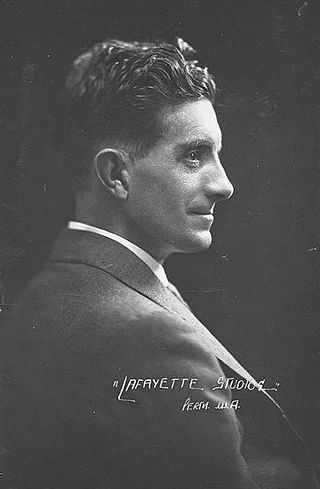
Arthur William Upfield was an English-Australian writer, best known for his works of detective fiction featuring Detective Inspector Napoleon "Bony" Bonaparte of the Queensland Police Force, a mixed-race Indigenous Australian. His books were the basis for a 1970s Australian television series entitled Boney, as well as a 1990 telemovie and a 1992 spin-off TV series.
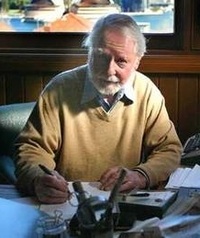
Jon Stephen Cleary was an Australian writer and novelist. He wrote numerous books, including The Sundowners (1951), a portrait of a rural family in the 1920s as they move from one job to the next, and The High Commissioner (1966), the first of a long series of popular detective stories featuring Sydney Police Inspector Scobie Malone. A number of Cleary's works have been the subject of film and television adaptations.
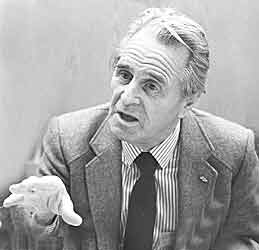
Harold Edward James Aldridge was an Australian-British writer and journalist. His World War II despatches were published worldwide and he was the author of over 30 books, both fiction and non-fiction works, including war and adventure novels and books for children.
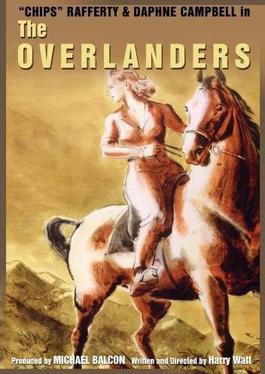
The Overlanders is a 1946 British-Australian Western film about drovers driving a large herd of cattle 1,600 miles (2,575 km) overland from Wyndham, Western Australia through the Northern Territory outback of Australia to pastures north of Brisbane, Queensland, during World War II.

Ellen Dymphna Cusack AM was an Australian writer and playwright.

Damien Peter Parer was an Australian war photographer. He became famous for his war photography of the Second World War, and was killed by Japanese machine-gun fire at Peleliu, Palau. He was cinematographer for Australia's first Oscar-winning film, Kokoda Front Line!, an edition of the weekly newsreel, Cinesound Review, which was produced by Ken G. Hall.
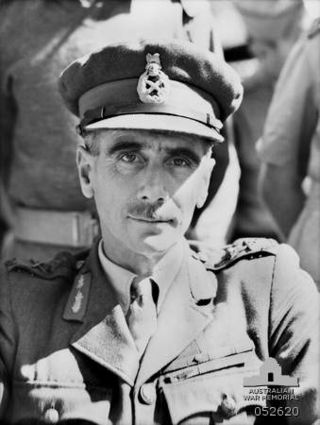
Major General George Alan Vasey, was an Australian Army officer. He rose to the rank of major general during the Second World War, before being killed in a plane crash near Cairns in 1945.

Zaros is a village and a former municipality in the Heraklion regional unit, Crete, Greece. Since the 2011 local government reform it is part of the municipality Faistos, of which it is a municipal unit. The municipal unit has an area of 71.803 km2 (27.723 sq mi). Population 2,565 (2021). Zaros village, at an altitude of 340 metres, is a village with a lake and gorge nearby. The village has a couple of hotels and it is 44 km from Heraklion at the southern foothills of Mount Psiloritis. The population produce olive oil, sultanas, vegetables and spring water. There are a couple of tavernas that serve trout. Close by is Rouvas Gorge, which is part of the Psiloritis mountain range and is on the hiking route known as the E4 European Walking Path. Nearby Zaros village are traditional water mills which have been working since the 16th century, as well as archaeological sites and monasteries. Zaros is also famous for its bottled water derived from Lake Votomos.

John Loder was established as a British film actor in Germany and Britain before migrating to the United States in 1928 for work in the new talkies. He worked in Hollywood for two periods, becoming an American citizen in 1947. After living also in Argentina, he became a naturalized Argentinian citizen in 1959.
Raymond Egerton Harry Watt was a Scottish documentary and feature film director, who began his career working for John Grierson and Robert Flaherty.
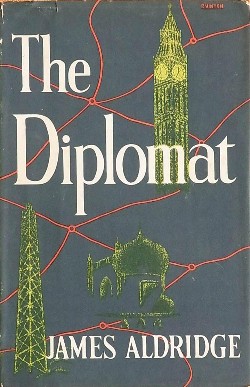
The Diplomat is a 1949 novel by the Australian writer James Aldridge.
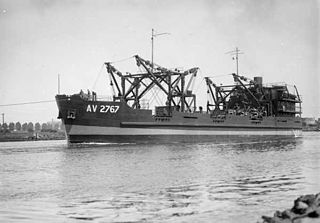
Crusader (AV2767) was an Australian Army amphibious operations support ship of World War II. She was launched shortly before the war ended and entered service in late 1935. From 1945 to 1947 she was mainly used to return Australian Army equipment from the islands off New Guinea. She was also loaned to the Australian Shipping Board in early 1947 and transported earth moving equipment and timber between Melbourne and Tasmania. However, the Army did not need a ship with Crusader's capabilities after the war, and she was sold in 1947 to the Queensland Cement and Lime Company which operated her as a coral barge on the Brisbane River until the mid-1980s. The ship was scuttled in 1986 and became a popular dive wreck.

George Sydney Aldridge was an Australian businessman, a longtime president of the Adelaide Stock Exchange.

Signed with Their Honour is a 1942 novel by Australian author James Aldridge. It was set during World War II in Greece. The novel is a fictional depiction of the activities of 80 Squadron during the British intervention in Greece. It is dedicated to the Commonwealth Ace of Aces, Pat Pattle, and Squadron Leader Hickey. The title is derived from a 1933 poem by Stephen Spender titled "The Truly Great."

Commander George Hermon Gill, was a Royal Australian Navy officer, mariner, journalist and naval historian who wrote the two volumes on the Royal Australian Navy in the official history series Australia in the War of 1939–1945.
The Arrow Theatre was an Australian theatre in the Melbourne suburb of Middle Park. It was located at 1–3 Armstrong Street, opposite the Middle Park railway station. It seated only 200 persons but had a stage large enough for ambitious productions.

















